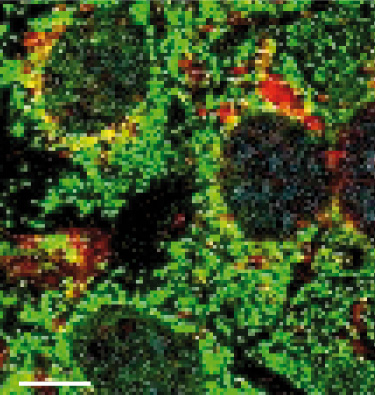27/06/2018
Print PageDegradation of cell organelles triggers immune defense against colon cancer

A prerequisite for recognizing cancer cells as "foreign" or "dangerous" is the presentation of cancer specific proteins (antigens) that can be recognized by tumor-suppressing T cells. However, there are also mechanisms which precisely suppress this T cell reaction. They make sure that the immune system does not attack your own body. In cancer, however, this protective function is a problem. The group of Florian Greten at the Georg-Speyer-Haus, Institute for Tumor Biology and Experimental Therapy at DKTK Frankfurt has found out how T cells can be reactivated. The research team has succeeded in stimulating colon cancer cells to increase the production of antigens. Mice then produced so-called CD8 + T cells against the tumor cells and the development of intestinal tumors could be slowed down or even suppressed. A central role within the tumor cells is played by lysosomes, small cell organelles that take over the breakdown of defective or aged components. Paul Ziegler, the lead author of the study, published in the online edition of Cell on June 14, 2018, observed that damaging these cell organelles by adding the malaria prophylaxis Chloroquin increases the production of antigens in the tumor cells. "Our data show that it is possible to stimulate tumor cells to produce antigens by targeted attacks on lysosomes and / or mitochondria so that they can be recognized and controlled by the immune system," comments study leader Prof. Greten. The researchers now want to investigate the effectiveness of mitochondrial turnover and damage of lysosomes on cancer immunotherapy in other models.
Original Publication:
Mitophagy in Intestinal Epithelial Cells Triggers Adaptive Immunity during Tumorigenesis. Ziegler, P.K. et al., 2018. DOI: https://doi.org/10.1016/j.cell.2018.05.028